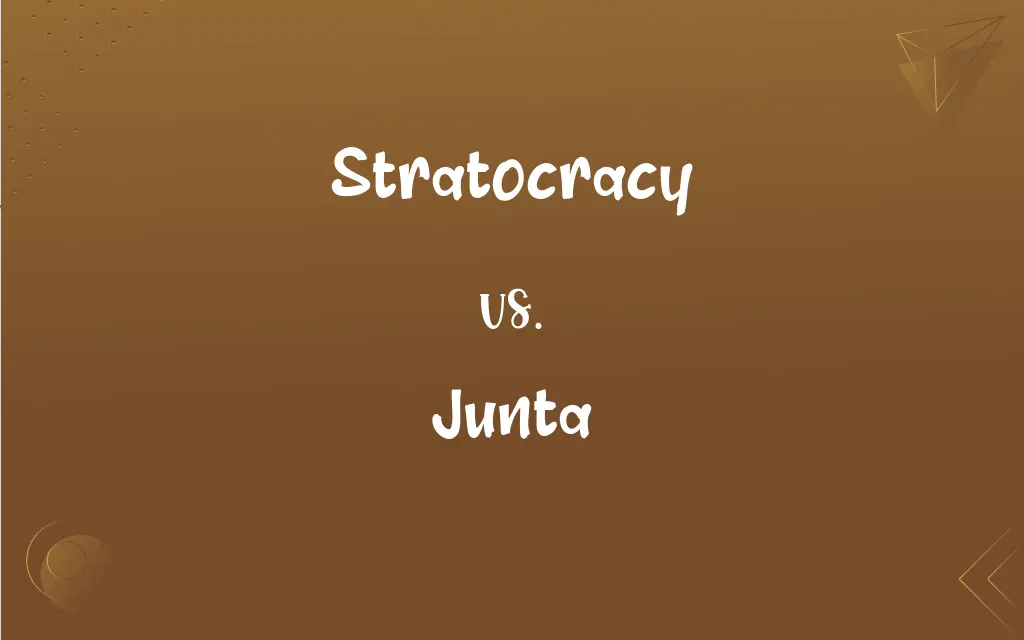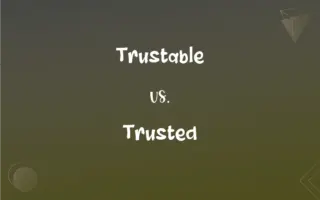Stratocracy vs. Junta: What's the Difference?
Edited by Aimie Carlson || By Harlon Moss || Updated on November 2, 2023
Stratocracy refers to a government run by military forces. Junta refers to a group that takes power, often after a coup.

Key Differences
Stratocracy is military-run governance, while a junta is a group seizing power.
Stratocracy implies formalized military control, whereas junta suggests a temporary takeover.
Stratocracy often has structured leadership, however juntas may have varied power dynamics.
Stratocracies can be stable. Conversely, juntas are often seen as transitional.
In stratocracies, military ethos permeates governance; juntas focus on control after a coup.
ADVERTISEMENT
Comparison Chart
Nature
Formal military rule
Power-seizing group
Stability
Can be long-term
Often transitional
Control
Systematic military governance
Seizure of power
Perception
Institutionalized
Often seen as illegitimate
Focus
Military ethos in governance
Immediate control after coup
ADVERTISEMENT
Stratocracy and Junta Definitions
Stratocracy
Government controlled by military forces.
The stratocracy maintained strict discipline.
Junta
A council of military leaders after a coup.
The junta imposed martial law.
Stratocracy
Rule by military without civilian government.
The country was a stratocracy, lacking civilian leadership.
Junta
A group that governs, often lacking legal legitimacy.
The international community condemned the junta.
Stratocracy
Governance where military power is supreme.
The stratocracy prioritized military spending.
Junta
Temporary rulers after usurping power.
The junta promised elections but didn't deliver.
Stratocracy
A system where military officials are also political leaders.
In the stratocracy, generals held political offices.
Junta
A group seizing governmental power, often after a coup.
The junta took control overnight.
Stratocracy
A state with integrated military and political structures.
In the stratocracy, military decisions influenced policy.
Junta
Military or political group ruling a country.
The junta dissolved the parliament.
Stratocracy
Government by the armed forces.
Junta
A group of military officers ruling a country after seizing power.
Stratocracy
A military government.
Junta
A council or small legislative body in a government, especially in Central or South America.
Stratocracy
A military government; government by military chiefs and an army.
Junta
The ruling council of a military dictatorship.
Junta
A council, convention, tribunal or assembly; especially, the grand council of state in Spain.
Junta
A council; a convention; a tribunal; an assembly; esp., the grand council of state in Spain.
Junta
A junto.
Junta
A small committee or group self-appointed to serve as the government of a country, usually just after a coup d'etat or revolution, and often composed primarily of military men. The term is used mostly in Latin American countries.
Junta
A group of military officers who rule a country after seizing power
FAQs
Is a junta illegal?
Generally seen as illegitimate due to power seizure.
Can a stratocracy have elections?
Rarely, as military control is paramount.
How long do juntas last?
They're often transitional, but durations vary.
Can juntas lead to democracies?
Sometimes, if they transition to civilian rule.
Are stratocracies common?
Relatively rare in modern global politics.
Can a stratocracy be internationally recognized?
It depends on various geopolitical factors.
Can a stratocracy have civilian courts?
Rarely, as military often controls legal aspects.
Does public opinion matter in a stratocracy?
Less so, as military holds dominant power.
Do juntas have a formal structure?
They can, but it's often less formalized than stratocracies.
Do human rights issues arise in stratocracies?
They can, due to strict military control.
Is a stratocracy always a dictatorship?
Not necessarily, but it's a military-dominated government.
Are juntas always military?
Often, but they can include civilian leaders.
Do stratocracies have civilian involvement?
Limited, as military holds significant power.
Is there a hierarchy in a stratocracy?
Yes, often a clear military hierarchy.
Do juntas face international opposition?
Often, due to the way they seize power.
Can a junta be peaceful?
Uncommon, as they often involve forceful takeovers.
Are stratocracies stable?
They can be, due to structured military control.
Is a junta a form of rebellion?
Often seen as such, especially if it overthrows an existing government.
Are juntas ever popular?
Occasionally, if they promise reform or stability.
Are juntas considered temporary?
Generally, though some may persist.
About Author
Written by
Harlon MossHarlon is a seasoned quality moderator and accomplished content writer for Difference Wiki. An alumnus of the prestigious University of California, he earned his degree in Computer Science. Leveraging his academic background, Harlon brings a meticulous and informed perspective to his work, ensuring content accuracy and excellence.
Edited by
Aimie CarlsonAimie Carlson, holding a master's degree in English literature, is a fervent English language enthusiast. She lends her writing talents to Difference Wiki, a prominent website that specializes in comparisons, offering readers insightful analyses that both captivate and inform.































































